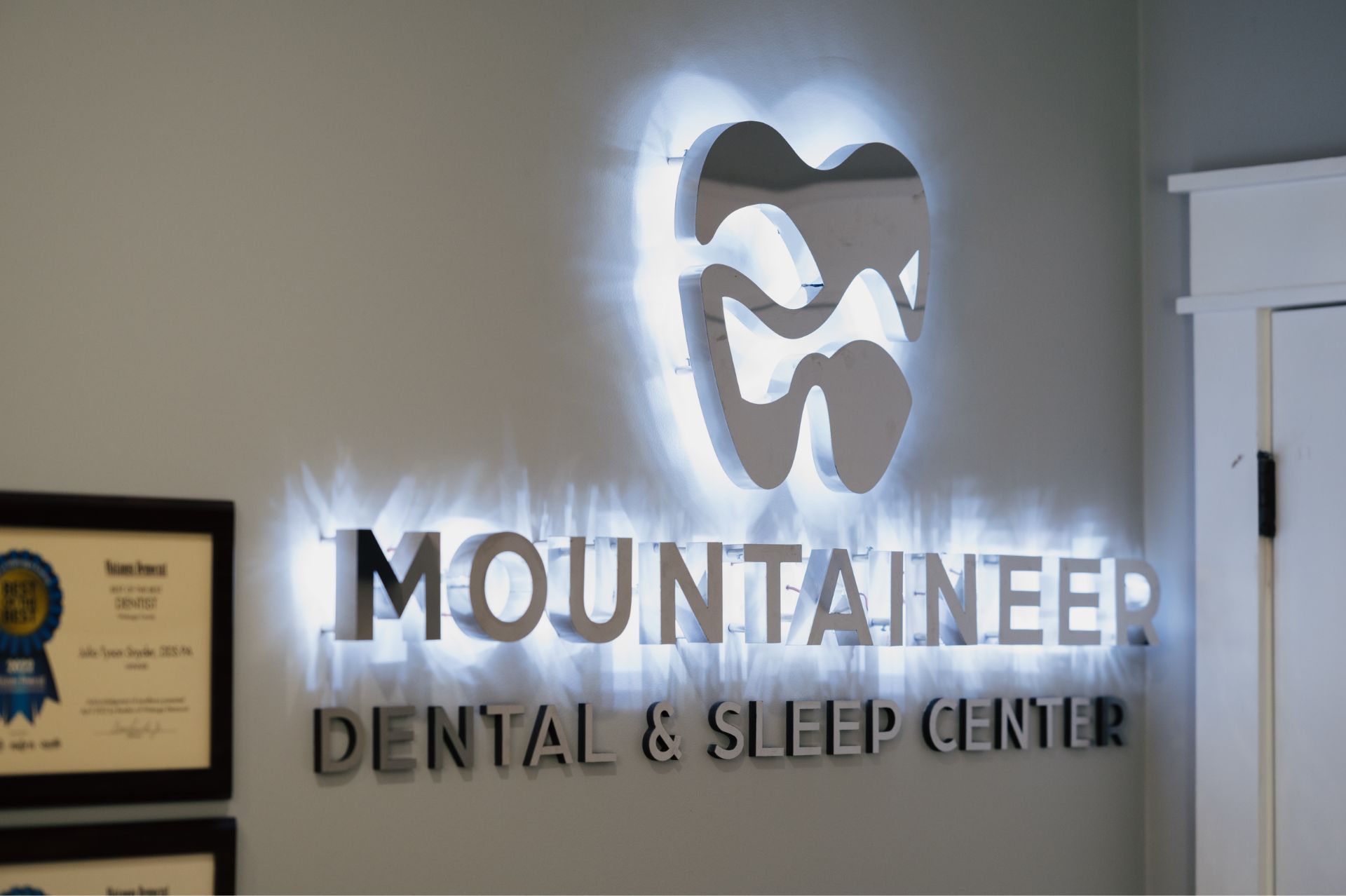Sleep Apnea

Expert Sleep Apnea Treatment
Enjoy Better Rest And Protect Your Health, Too
If you snore at night and experience other symptoms like frequent waking and difficulty falling or staying asleep, you may have sleep apnea. Nearly 20% of Americans suffer from some form of sleep apnea, with up to 85% of cases being undiagnosed.
If left untreated, sleep apnea can stop you from getting proper rest at night in the short term and lead to other health issues like an increased risk of heart attack and stroke in the long term.
But at Mountaineer Dental and Sleep Center, we’re here to help. As a diplomate of the American Board of Dental Sleep Medicine, Dr. Julie Snyder is an expert in treating obstructive sleep apnea (OSA), the most common form of sleep apnea.
Understanding Sleep Apnea
While there are multiple types of sleep apnea, Obstructive Sleep Apnea (OSA) is the most common. In this type of sleep apnea, tissue in the mouth and throat starts to “sag” into the airway. This causes breathing interruptions that can last anywhere from 10 seconds to 2 minutes.
These pauses in breathing interrupt proper respiration and reduce blood oxygen levels. In the short term, this can cause a variety of issues like waking up frequently at night, poor quality sleep, and daytime drowsiness, to name just a few.
In the long term, though, sleep apnea is even more dangerous. Because it interrupts normal respiration, it puts a lot of stress on your cardiovascular system. This can lead to issues like high blood pressure and a higher risk of heart attack or stroke.
Recognizing The Common Signs Of Sleep Apnea
Not sure if you have sleep apnea? The best way to find out is by consulting with a sleep specialist and taking a sleep study. But even if you haven’t been diagnosed yet, there are a few signs you can look out for that may indicate the presence of sleep apnea:
- Loud, frequent snoring throughout the night
- Pauses and interruptions in breathing, often noticed by a sleeping partner
- Difficulty falling asleep and staying asleep
- Waking up with a gasping or choking feeling
- A dry or sore throat when waking up in the morning
- Fatigue and drowsiness in the day, even after a full night of sleep
- Mood changes, including anxiety and depression
- Difficulty focusing and concentrating
Sleep apnea is different for everyone. But if you notice more than one or two of these issues, we recommend taking a sleep study. Once you are diagnosed, Dr. Julia Snyder can help you explore your options for treating sleep apnea, including oral appliance therapy at our office.
Treatment Options For Sleep Apnea
The proper treatment for sleep apnea depends on the severity of your condition, whether you have obstructive or central sleep apnea, and a variety of other factors. Wondering what to expect? Here is an overview of the most common treatments for sleep apnea.
Oral Appliance Therapy (OAT)
At Mountaineer Dental and Sleep Center, we specialize in Oral Appliance Therapy, or OAT for short. Dr. Julia Snyder is a Diplomate of the American Board of Dental Sleep Medicine (ABDSM) and can treat mild to moderate obstructive sleep apnea with OAT.
Oral appliance therapy uses a special type of mouthguard to treat obstructive sleep apnea. When worn at night, this mouthguard shifts the jaws into a healthier position, preventing soft tissue from sagging and blocking your airway.
In turn, this eliminates the symptoms of obstructive sleep apnea. OAT is a fantastic choice for patients who would like to avoid the inconvenience of CPAP machines. It’s effective, requires no power or batteries, and can be used in any sleeping position, unlike a CPAP machine.
CPAP (Continuous Positive Airway Pressure) machines
CPAP machines use a face mask and a pump to send a stream of pressurized air into your airway. This prevents tissue from sagging and ensures you can keep breathing steadily throughout the night.
CPAPs are usually a good option for severe sleep apnea. They do have some drawbacks, though. They require power, frequent maintenance, and adjustments to your sleeping position in order to ensure their effectiveness.
Lifestyle changes
Along with other treatments like OAT or a CPAP machine, lifestyle changes can help reduce the severity of sleep apnea. Things like losing weight, avoiding drugs and alcohol, sleeping on your back, and practicing good “sleep hygiene” can help reduce the symptoms of sleep apnea.
Surgical intervention
Surgery is only needed for severe cases of obstructive sleep apnea. Every patient is different, but surgery usually involves removing some of the tissue from your throat and airway. For example, if you have enlarged tonsils and adenoids that are causing sleep apnea, surgery may be used to remove them and prevent obstruction of your airway at night.
Schedule Your Sleep Apnea Consultation Today
If you’ve been diagnosed with sleep apnea in Boone, NC, and would like to explore your options for treatment, Dr. Julia Snyder is here to help. Thanks to her expertise as a diplomate of the American Board of Dental Sleep Medicine, Dr. Snyder can help you get powerful, long-lasting relief from both the short and long-term effects of obstructive sleep apnea.
So don’t wait. With the advanced sleep apnea solutions available at Mountaineer Dental and Sleep Center, restful sleep is closer than you may think. Give us a call at (828) 265-1112 or contact us online to book your visit with Dr. Snyder and get the expert care you need.
We can’t wait to connect!
Call 828-265-1112 or request an appointment online to set up your first visit. We’ll be in touch soon.
